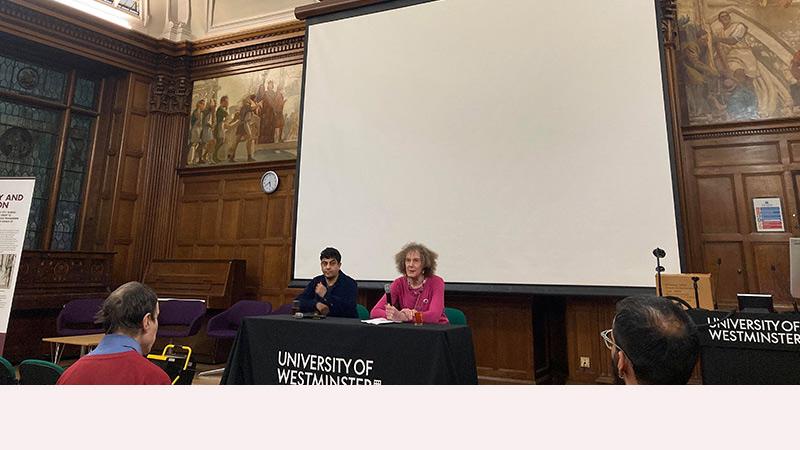Pippa Catterall, Professor of History and Policy at the University of Westminster and Chair of AIDS Memory UK, explored why a London AIDS Memorial matters with Ash Kotak, the organisation’s Founder, in a Westminster Conversations event on Thursday 16 February 2023 at the University’s Fyvie Hall.

AIDS Memory UK exists to honour and commemorate the people that have lost their lives in London because of AIDS, to acknowledge and celebrate all those who fought so hard for progress in the fight against AIDS and the injustice of HIV stigma, and to remind people that new HIV infections and deaths from AIDS related illnesses are not a thing of the past, at a time when society has the tools to avoid new infections and stop further deaths.
Talking about the history of HIV and AIDS in the United Kingdom, Kotak noted that AIDS changed British society. AIDS began to make a large impact in Britain during the 1980s, against the backdrop of government legislation such as Section 28 which prohibited the ‘promotion’ of homosexuality by local authorities.
Discussing the stigma the LGBTQ+ community faced in the period, Kotak said: “You had no choice but to become an activist […] the AIDS memorial is partly about what we went through. People were kicked out by their families, kicked out of their apartments because of the stigma around AIDS.
“When creating the AIDS memorial, we’re creating the world we want to live in. One of acceptance, one of understanding. We are fighting so that we can have these conversations.”
Professor Catterall said: “Part of having a memorial is about remembering the past, raising awareness, but fighting to end AIDS too. The history of AIDS very much lives on into the present day. Memory is connected to emotion. Lots of memory needs to be brought together so it can become history.”
AIDS has claimed the lives of at least 37 million people around the world, with 690,000 people dying from the related illnesses last year alone. Life-saving medicine to ensure people living with HIV live long and healthy lives is not available in many parts of the world for several reasons including the prevalence of widespread HIV stigma, laws against LGBTQ people, racism, misogyny, bad healthcare and service providers as well as the prohibitive cost of treatment.
The design specifications for this monument are still being set and are very much intended to produce a high-quality and compelling piece of public art open to the public. It will be near Tottenham Court Road in Central London. Its location is significant as it is close to the former Middlesex Hospital, which was the UK’s first AIDS ward, James Pringle House, a sexual health clinic that saw some of the first patients in the UK with HIV and AIDS and The Bloomsbury Clinic, the busiest HIV clinic in the UK.
Find out more about the memorial on AIDS Memory UK’s website.
The talk formed part of the University’s programme of LGBT+ History month events.



